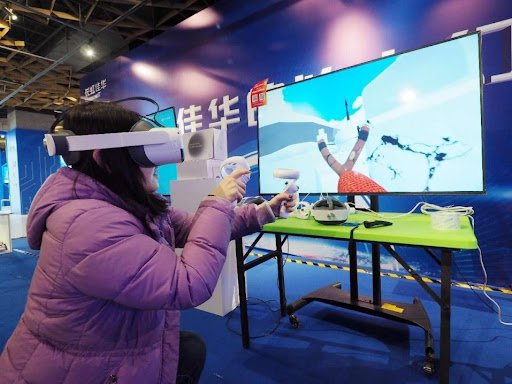By Lin Lili, People’s Daily
Digital consumption is becoming an important driver for expanding domestic demand, stabilizing economic growth, and promoting industrial transformation in China.
From January to November in 2023, China’s online retail sales reached about 13.96 trillion yuan ($1.96 trillion), up 11 percent year on year.
Currently, the burgeoning new forms and models of digital consumption, represented by online shopping, livestreaming, and digital culture, are profoundly changing people’s consumption habits.
Thanks to livestreaming promotions, a consumer in Beijing can clearly see a sheep farm over 1,000 kilometers away in Huanxian county, Qingyang city, northwest China’s Gansu province, without leaving his home.
“The sheepfold looks quite clean and the sheep all seem energetic. Seeing is believing. I think this shop’s mutton must be good,” said Xu Jie, the customer, sitting at home holding his phone.
Compared to brick-and-mortar vegetable markets, livestreaming can sometimes offer consumers more information about products, he explained, adding that now he often makes purchases online.
“Business has been pretty good lately. With so many regular customers, I can sell about 120 sheep a day,” said Liu Guoning, an entrepreneur in Huanxian county.
According to Liu, he used to take sheep to the market to sell, or wait for buyers to come to his farm, while now he sells mutton online.
“Since I sold mutton online, I’ve not only been able to sell all the sheep from my own farm, but also help sell the sheep of other villagers. The profits and efficiency are much better,” he noted.
One of the prominent features of digital consumption is the broader scope of shopping, which plays a key role in boosting domestic demand.
Nowadays, as consumers’ online shopping radius keeps expanding, they can buy products from various parts of the country and even the world without leaving home.
As a result of the continuous improvement of China’s rural digital infrastructure and e-commerce logistics systems, local specialties such as mushrooms, eggs, and meat produced in remote regions of the country can now be sold nationwide through e-commerce platforms.
Pinduoduo, a major Chinese e-commerce platform, has established direct connections with over 1,000 agricultural production areas in China, involving more than 16 million farmer households to the digital economy, according to Zhang Chao, said an operation magager of Pinduoduo.
“We have actively promoted the application of digital technologies in the circulation and supply of agricultural products, and vigorously advanced the construction of digital information infrastructure, including cold chain logistics of fresh agricultural products,” Zhang said.
The platform has implemented measures including sending out products within 48 hours after an order is placed and free express delivery services for consumers in remote areas in a bid to boost sales, according to Zhang.
By switching from offline transactions to online transactions, consumers can easily access information about products and services, which saves time and transportation costs that could be incurred during consumption, and expands consumers’ shopping radius, giving them more options and autonomy in consumption, said Li Mingtao, head of the research institute at the China International Electronic Commerce Center.
Digital technologies not only broaden consumers’ shopping radius, but also incubate new industries, new business forms and models, ushering in greater possibilities of consumption in the country.
In Beijing’s Dongcheng district, a consumer named Lin Qing obtained her own digital model after placing an order online, signing an agreement, and having her face scanned, all within about 30 minutes at a special photo studio that creates digital twin for customers.
Lin’s digital twin realized many of her dreams in the virtual world, including scoring slam dunks, enjoying skiing, and performing street dance.
“It’s really interesting to see the familiar ‘me’ doing unfamiliar things. I feel like I met another ‘me’ from a parallel universe,” Lin said.
“We’re building an ecosystem of digital humans where everyone may one day own their digital twin,” said Liu Zheng, founder of the studio.
In 2023, Chinese people discovered a proliferation of artificial intelligence (AI)-empowered digital humans in various scenarios.
They saw digital hosts present weather forecast programs, speakers’ digital twins take the stage at major conferences, digital livestreaming hosts work 24/7, and digital humans share life wisdom in short videos.
The application of AI have been stretched into various fields, from healthcare, education, finance to transportation, entertainment, and sports, changing the way people live and work.
“The extensive application of the Internet, cloud computing, AI, among other new technologies, has enabled digital technologies to better satisfy people’s needs for a better life and unleash consumption potential, making digital technologies a new driving force for consumption growth and economic development,” said Ren Baoping, a specially appointed professor of the school of digital economy and management of Nanjing University in east China’s Jiangsu province.
“We hope to accelerate the expansion of emerging consumption areas like customized consumption, smart consumption, and experiential consumption, as well as to increase effective supplies for digital consumption in healthcare, elderly care, medical services, culture, education, security and other fields,” Ren added.






